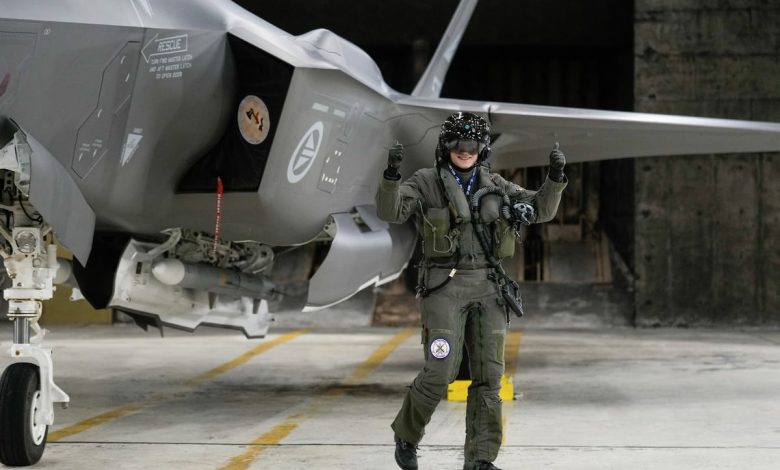F-35 nations prize spare parts, as US dismisses kill-switch angst

MILAN — Norway became the first F-35 partner nation to fulfill its program of record with the delivery of the last two F-35A airframes this month, marking the completion of the Scandinavian country’s order of 52 aircraft, manufacturer Lockheed Martin said.
The announcement followed the establishment last month of a new F-35 maintenance centre in Rygge, Norway. The sustainment work and future upgrades will be carried out at the new 5,000 square-meter facility by Kongsberg Aviation Maintenance Services and the Norwegian Defense Materiel Agency.
Before this, intermediate-level upkeep for the Norwegian fighter jets was done at the Italian F-35 maintenance hub in Cameri.
The creation of a national facility will allow Norway to gain an independent capacity to perform this work locally, strengthen supply chains, and increase operational availability, a Kongsberg statement said.
Since U.S. President Donald Trump took office in January, concerns have grown in Europe about the extent to which Washington could exercise control over F-35 fleets globally. Such worries spring from a new degree of unpredictability of an ally whose weapons exports have underwritten much of the West’s deterrence architecture for decades.
Lockheed executives have refuted the existence of a remote F-35 “kill-switch” by which leaders in Washington, soured on Europe, could turn the aircraft into expensive chunks of metal. At the same time, the inner workings of the warplane’s sprawling ecosystem for operations and maintenance are, by design, a U.S. construct, meant to offer client nations peace of mind because of Washington’s backing.
One spotlight now lies on the distribution of spare parts, a potential bottleneck that F-35 nations are moving to preempt.
Endre Lunde, special adviser to the Norwegian Defense Materiel Agency, said it is rare to see spare parts transferred from one F-35 nation to another, with components remaining American property until they are mounted on a country’s jets.
At that point, they are handed over to the user country for budget, accounting and custom purposes, and this also applies to any parts manufactured by the Norwegian industry for the F-35, Lunde explained.
“They do so as subcontractors of the F-35 prime contractors, [therefore] the parts are exported to them for use either on new aircraft or to be used as spare parts – we do not buy F-35 parts directly from our industry, as all of them are pooled or distributed to the user nations through combined contracts,” Lunde told Defense News in an email statement.
As F-35 countries rarely possess more components than what they require for their daily operations or national readiness stocks, it is infrequent to see instances where spares are sent to other users.
“So far, the only examples we’ve had of F-35 parts leaving Norway have been when they are shipped back to the U.S. for repair and replacement,” Lunde said.
Mediterranean footprint
On March 24 a U.S. F-35 based in the UK touched down at Cameri air base to become the first American jet to check in for a tune-up at Italy’s Maintenance, Repair, Overhaul, and Upgrade (MRO&U) hub.
Funded by Italy and managed by local firm Leonardo, the center is co-run with Lockheed Martin and the F-35 Joint Program Office and has already serviced Italian, Norwegian and Dutch F-35s.
The tighter cooperation on F-35 logistics is giving Europe greater responsibility while at the same time creating greater inter-dependance with the U.S.
Dubbed the F-35 Euro-Mediterranean Airframe Depot, the center sits alongside a final assembly line for the jet which has turned out Italian and Dutch F-35s and is where Lockheed Martin staff have handled sensitive aspects of assembly such as anti-radar coatings.
Cameri is the only site in Europe offering heavy maintenance and is now expanding its operation as European fleets grow.
Capt. Sigfrido Chiandussi, the Italian national deputy with the F-35 Joint Program Office, said Italy’s investment in the centre was “significant”, adding, “we are confident that our investment will yield significant returns in terms of regional security, stability, and prosperity for all.”
Security of supply
In general, every F-35 nation also maintains a national readiness stock of spare parts for its aircraft, known as security of supply. For Norway, this has looked like investing in separate spare parts packages for the country’s readiness requirements, where it can operate the aircraft independently for a certain period during crises.
In the Netherlands, which stands to get upwards of 50 of the sixth-generation aircraft, a court case last year by three humanitarian organizations seeking to block the shipment of F-35 parts to Israel shed some light on how logistics for the stealth aircraft are managed. Woensdrecht Air Base, the main support base of the Royal Netherlands Air Force, acts as one of three global distribution hubs for F-35 parts for several countries.
The three hubs store U.S. supplied parts that are then forwarded to F-35 users, with the parts remaining property of the U.S. until they’re mounted on an F-35, according to court documents. The Dutch distribution hub supplies parts to countries including the Netherlands as well as Israel, which is a user but not a partner in the F-35 program.
The Netherlands made the choice in 2001 to participate in development of the F-35, and the country says Dutch firms provide airframe parts, cables, in-flight opening doors and parts of the power supply and radar systems.
The Norwegian Air Force, for its part, trains regularly for situations where it may not have access to central maintenance servers and must fly the aircraft unassisted for a given length of time, Lunde said.
Finland, which has ordered 64 F-35s, has a similar security clause in place. According to a Finnish Air Force Command representative, the national production capabilities are reinforced by a spare parts reserve that is under national control and ensures “continuity of operations in all situations.”
Tom Kington in Rome and Rudy Ruitenberg in Paris contributed to this story.
Elisabeth Gosselin-Malo is a Europe correspondent for Defense News. She covers a wide range of topics related to military procurement and international security, and specializes in reporting on the aviation sector. She is based in Milan, Italy.







